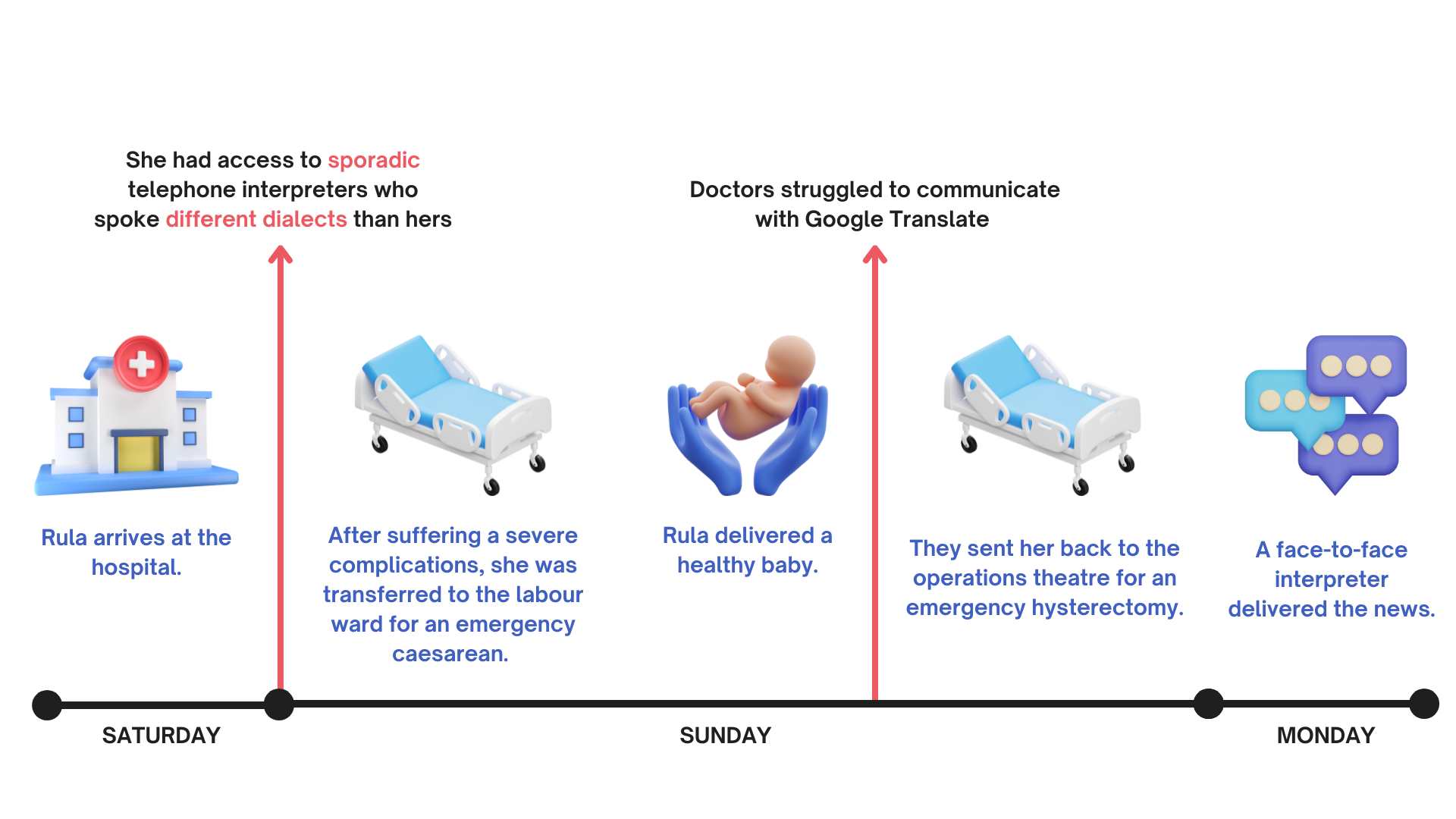An Investigation Reveals that NHS Interpreting Services Problems Have Contributed to Patient Deaths

Distressing news has become widespread across UK media channels as the BBC reveals that the NHS's failure to provide high-quality interpreting services has been a contributing factor in the deaths of at least 80 babies in England between 2018 and 2022.
Matthew Hill, multi-award-winning Health Correspondent at BBC News, extensively covered some cases and conducted interviews with individuals who faced the consequences of these experiences.
After listening to the insightful episode from the BBC’s File on 4 documentary series, “Lost in Translation”, we have undertaken the task of summarising key topics disclosed in the report, reflecting on why this news represents a significant problem in our national healthcare system.
Not Knowing What Doctors Are Doing to You or Your Loved Ones
Imagine a situation where you find yourself in a hospital room, with doctors coming in and out showing affliction on their faces. They speak, but you cannot comprehend a single word. Yet, you sense that something is amiss, and it appears they are preparing for a serious procedure.
Rula (whose name was changed to protect her identity) didn't have to imagine this scenario; she lived through it. Originally from Syria, and anticipating the birth of her first child, Rula arrived at the Princess Royal Maternity Hospital in Glasgow on a Saturday morning in April 2022.
However, throughout the next day, Rula started to experience severe pain, but she struggled to inform the medical staff about what was going on. Despite having access to sporadic telephone interpreters, she could not communicate clearly with them due to their different dialects.
Upon being transferred to the labour ward, a place where only one companion is admitted, Rula was forced to make a choice: going in with her husband, who spoke no English, or a charity support worker, who spoke no Arabic. Rula chose the support worker because "they would at least understand what the doctors were saying."
As she recounted to the BBC, Rula phoned her husband, saying,
“There was something abnormal. The doctors are very scared, they’re in and out of the room, and I don’t know what’s going on”.
Following an emergency caesarean, Rula awoke to find her healthy baby beside her. However, her joy was short-lived. Rula began to bleed severely, and for about 15 minutes, doctors attempted to use Google Translate to convey that they needed to return her to the operating theatre for a potential hysterectomy to remove her uterus.
“Sometimes I could understand them, sometimes I couldn’t understand them, but I begged them, please don’t remove my uterus”, shared Rula.
Unfortunately, the hysterectomy had to take place, and a face-to-face interpreter arrived at the hospital the next day to inform Rula that she would not be able to have more children. As explained by Matthew Hill, 'Rula just wishes they'd been there the day before.'

Not Being Awarded the Right to Consent
Rana Abdelkarim faced a similar situation when called to a hospital in the late stages of her pregnancy, thinking it was a routine check-up meeting.
Rana and her husband, Modar Mohammednour, had arrived in the UK after having to leave their home country, Sudan, due to severe political conflicts. Both had limited English vocabulary. When informed that his wife was going to be 'induced,' Modar was unaware of the term's meaning, and he knew that his wife also did not understand.
Modar had been assured that he would receive a phone call from the hospital, notifying him when his wife was ready for labour so he could be present during the birth. However, he never received the call. Instead, they contacted him after her daughter was born, urgently summoning him to the hospital.
“Honestly, I didn’t put in my mind [that] my wife had passed away. I didn’t have this in my brain” explains Modar.
Rana had suffered a severe bleed after labour, and doctors could not save her. The maternity section of the Healthcare Safety Investigation Branch, now part of the Care Quality Commission, discovered that there had been a 30-minute delay to summon a specialist team of doctors to attend to Rana and an hour-long delay in providing a blood transfusion.
Throughout this time, Rana lacked access to an interpreter and was described as "uninformed about the reason for her admission."

Rana Abdelkarim before her death in 2021.
According to the NHS, induced labour is typically planned in advance, and doctors must discuss the advantages and disadvantages with the mother and midwife. The mother should be given the choice to decide whether she wants induced labour. However, without an interpreter and lacking proper information about her situation, Rana was denied the fundamental right to consent to the procedure.
When asked about the difference an interpreter would have made in his wife’s situation, Modar explained, “They would help me and would help her to take the right decision for how she is going to deliver the baby, and she can know what is going to be happening to her”.
Critical Lack of Cultural Understanding in the Public Sector
Rula explained that during her hospital stay, she was provided with different interpreters over the phone. Still, these interpreters were 'from all over the world,' meaning they spoke different dialects than Rula.
“They told me ‘we cannot understand you’ and I couldn’t understand them either,” she says.
Another case reported by the BBC was Fatima’s (whose name was also changed for privacy concerns). She was the victim of physical and sexual abuse by her estranged husband for several years, prompting her to contact the Metropolitan Police earlier this summer.
After her first attempt to give a formal statement to the police failed due to the inaccuracy of the interpreter in translating her situation, Fatima had a second appointment with another linguist to provide accurate information to the police.
Nevertheless, on this second opportunity, Fatima was still not impressed by the result of her appointment. She mentioned that the interpreter could only understand about ¾ of what she said.
“Once again we come back to the language issue. When I talked in my own Sudanese dialect, she could not understand me; I needed to make an effort so that I let her understand what I am saying remarks Fatima, “to tell you the truth, she was a kind person, and when I corrected her, she’d smile”.
Interpreters will often do their best to understand other dialects, but there’s a limit to what they can do. Problems like these are not the interpreter’s fault but a clear sign of the lack of cultural understanding that public sector organisations have when looking for suitable interpreters.
Mike Orlov, Executive Director at the National Register of Public Service Interpreters (NRPSI), explained:
“[There’s a] lack of understanding by the public sector employees. ‘You speak Bosnian, well, can’t you handle Serbian as well?’ They’re different languages, they use different scripts. This is down to a lack of understanding of the complexity of languages”.
As we illustrated in our blog Addressing Ethnicity-Related Challenges in Access to Public and Private Services: A Guide for Organisations, public sector organisations frequently perceive cultures as a barrier in their communication with individuals from diverse ethnic backgrounds. In our experience, ethnic minority communities are often labelled as "hard to reach" by statutory services.
However, it could be argued that it is statutory services that are challenging for people from various ethnic minorities to access.
Public sector employees must undergo cultural competency training to ensure a fundamental understanding of how culture, race, ethnicity, and languages vary across countries worldwide.
In cases like Fatima's, it becomes evident that she required a Sudanese interpreter, as opposed to an Egyptian, Libyan, or Palestinian interpreter, even though they all speak Arabic. This nuanced understanding is essential to providing effective and sensitive support to ethnically diverse communities in the UK.
Our Conclusions
As elaborated in our previous section, the significant, potentially life-threatening problems stem from the lack of understanding among those who fail to recognise the immense importance of an interpreter in critical situations such as hospital emergencies, court cases, and police declarations.
The Equality Act 2010, safeguards all individuals in the UK from direct and indirect discrimination and should serve as a foundation for anyone demanding an interpreter when accessing public sector services in the country.
An investigation report by the Health Services Investigation Body, explains the following concerning national maternity services:
“Investigations found that although translation services are available, they may not be available or utilised by staff at the relevant time. Investigations also noted that family members or staff who speak the relevant language were used as interpreters, which may have resulted in some misunderstandings. There is often an assumption that if the mother can speak ‘good English’ she understands all the aspects of the discussion regarding her care. This can lead to a mismatch between what the mother has been told and what she understands”.
While the specifics of each case involving the 80 babies who died between 2018 and 2020 remain unknown, no woman should have been deprived of access to information about her situation. No individual should face additional challenges and vulnerabilities in a life-threatening situation if our healthcare system can prevent it.
Vandu Languages’ Annual Conference

The issues brought to light by the BBC regarding NHS and public sector interpreters necessitate a more in-depth analysis than may initially be perceived.
Discussing these topics is crucial to address health inequalities in developed countries such as the UK, and to ensure that public service providers are aware of their current shortcomings and how they can enhance service delivery for ethnic minorities.
On March 6th 2024, in collaboration with our sister company, Diversity Resource International (DRI), we will host our Annual Conference 2023/2024.
The theme for this occasion will be EDI and cross-cultural training. We pledge to facilitate positively disruptive discussions about cultural awareness, the existing racial inequalities in the UK, and the tangible impact (both positive and negative) that EDI policies have had on numerous public and private sector organisations.
The event is free and open to community members, statutory and non-statutory organisations, universities and colleges, community leaders and anyone interested in gaining insights from guest speakers and leaders in the field.
If you are interested in participating, we kindly request you to confirm your attendance here to ensure the best possible experience.
About Vandu Languages
Vandu Languages is a language services provider based in southeast England. We specialise in offering translation and interpreting services, along with bilingual advocacy services for health and social care organisations. Additionally, we provide cross-cultural training for public, private, and third-sector organisations.
As an ethnic minority-led organisation in the UK, we closely observe the influence of British society on ethnic minorities and the evident disparities in accessing public services.
Our mission is to assist individuals, businesses, and organisations in overcoming language barriers. We provide qualified language specialists to give a voice to those whose first language is not English.
After reading this article, you might be interested in exploring the following offerings:
Interpreting Services: Vandu has been delivering language interpreting services in Sussex and throughout the UK for over two decades, serving both business and individual clients. For more information, please visit our website or contact us at info@vandu.co.uk or 01273 473986.
Breaking Barriers Training: our "Breaking Barriers” Workshop, developed by our Language Ambassador, Sabah Kaiser, addresses barriers that ethnic minority groups may face when interacting with statutory or non-statutory services. For details on this training opportunity, click here or get in touch with us.
LinkedIn Newsletter / Blogs and News Pages: every week, we publish two new articles in our LinkedIn Newsletter and on our website’s Blogs or News pages. Similar to this one, these articles aim to elucidate the intricacies of language services and their impact on ethnically diverse communities. We frequently provide advice for organisations, businesses, and aspiring language professionals.
